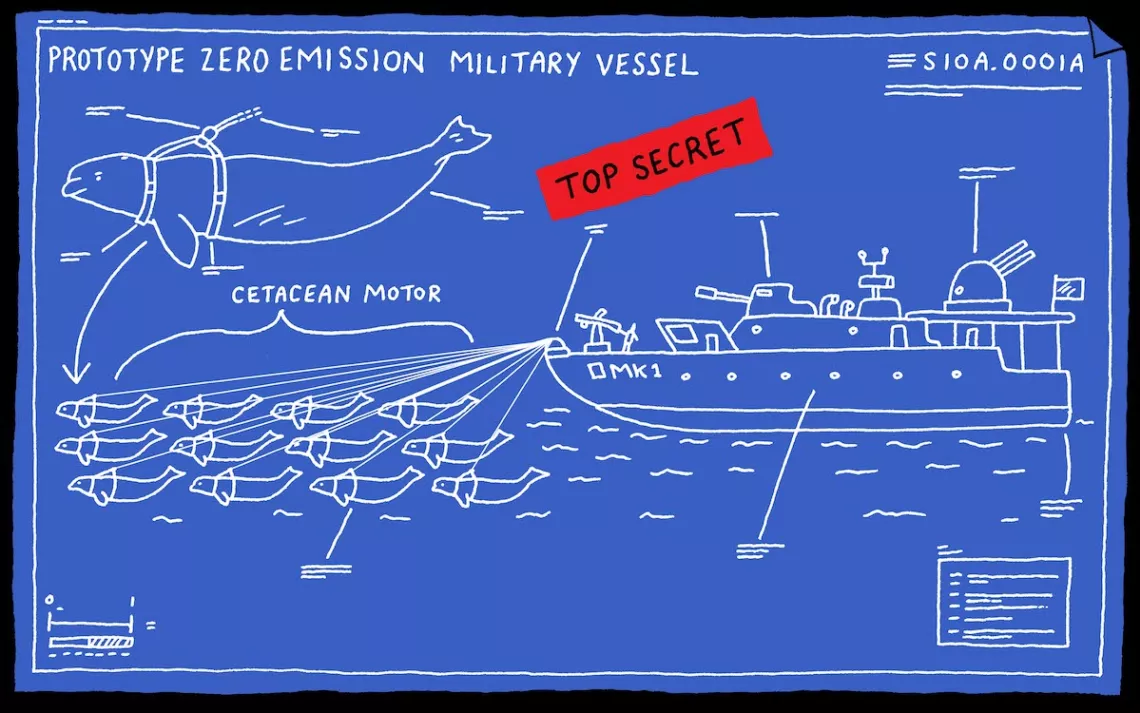ICYMI: Spy Whale, Measles Fail, Sinking Jakarta & More
A weekly roundup for busy people

Illustration by Peter Arkle
A beluga whale captured in Norwegian waters is apparently part of a Russian sea-mammal military program.
An unidentified western electric utility was the victim of a “denial of service” cyberattack in March.
In April 2019, for the first time ever, more US electricity generation came from renewables than from coal.
Former West Virginia coal magnate Don Blankenship sues Donald Trump Jr. for defamation, for calling him a “felon” on Twitter. Blankenship served a year-long sentence after a misdemeanor conviction for conspiring to violate federal mine safety standards in connection with the explosion at his Upper Big Branch coal mine in 2010 that killed 29 miners.
A controlled explosion demolishes the two 500-foot cooling towers of Brayton Point Station, Massachusetts’s last coal-fired power plant (video).
After Duke Energy tries to raise its customers' fixed charges by 238 percent, South Carolina’s Public Service Commission slashes the request by more than half and disallows 75 percent of Duke’s CEO’s “excessively high executive compensation.”
Antarctica’s enormous Ross ice shelf is melting 10 times faster than the continent’s landfast ice because of sun-warmed ocean waters.
Indonesia is moving its capital away from Jakarta, in part because the city of more than 10 million people is sinking.
Mozambique is hit by an unprecedented second large cyclone this cyclone season, affecting 160,000 people.
CNN finds that climate change is the number one issue for Democratic voters.
All of Burger King’s 7,200 US outlets will sell meatless Whoppers by the end of 2019.
More than 700 people in the United States have contracted measles this year, a 25-year high.
After three years of exposure to the elements, “biodegradable” plastic bags are still sufficiently intact to carry groceries.
A zookeeper in Salzburg, Austria, is fired for growing 33 marijuana plants in the rhinoceros enclosure.
In Scotland, beavers are given protected status.
Outdoor equipment manufacturer Mountain Hardware will stop using flame-retardant chemicals in its tents.
An Anchorage businessman is convicted of spreading a pesticide on a public right-of-way used by homeless people.
The Texas state senate approves $10 million for herbicides to kill carrizo cane, which provides cover for people crossing the border in the Rio Grande Valley.
Bayer AG shareholders revolt over the board’s continued support for CEO Werner Baumann, who engineered the $63 billion acquisition of Monsanto. After Bayer’s takeover, Monsanto lost $39 billion in market value, largely as a result of reports that its flagship weed killer Roundup causes cancer.
P-47, a large, healthy mountain lion in Southern California’s Santa Monica Mountains, dies after ingesting rat poison.
The Interior Department eases safety rules for offshore drilling that were put in place after the 2010 Deepwater Horizon disaster.
Hybridization enables Gulf killifish to adapt to extreme pollution in the Houston Ship Channel.
Sherpas on the Tibetan Plateau may have inherited their ability to tolerate low-oxygen, high-altitude conditions from the Denisovans, an ancient species of early hominin.
 The Magazine of The Sierra Club
The Magazine of The Sierra Club



